
Bobby Terrebonne is not a man to sit on his hands and complain without trying to make things better. For seven years he has sat on the Gulf of Mexico Red Snapper Advisory Panel and served on the Ad Hoc Red Snapper Advisory Panel.
But he questions his involvement.
“The Gulf Council never listens to the advisory panels, and (the National Marine Fisheries Service) never listens to the Gulf Council. Management needs to be given to the states. Too many tree-huggers are driving NMFS actions.
“We have more red snappers than we have had in years, and we get (a shorter) season. I don’t believe that red snappers are overfished. I’ve been fishing the Gulf all my life. When we had April to October seasons, we didn’t have a problem catching snappers.”
Terrebonne snorted at the thought of a nine-day federal season, what NOAA Fisheries initially provided for Louisiana fishermen in 2013, as well as the 11-day season on the table at press time for this article. There has even been talk of this year’s season being shortened.
“They don’t realize the economic impact of what they do to coastal communities,” Terrebonne said. “NMFS wants to control everything.”
Terrebonne seems to have a particular bone to pick with the NMFS Southeast Region Administrator Roy Crabtree, and he isn’t shy about admitting it.
“Roy Crabtree is the problem,” Terrebonne said. “He doesn’t like Louisiana. He made a statement that Louisiana fishermen are a bunch of poachers.
“The problem started with TEDs and sea turtles. Louisiana fought (NOAA Fisheries) tooth and nail. They never forgave us for that.”
The face-off over red snapper management in 2013 illustrates the root of Terrebonne’s frustration. On March 23 of that year, the state of Louisiana defied federal rules and opened a recreational red snapper season on Fridays, Saturdays and Sundays in state offshore waters with a daily bag limit of three fish.
The rule specified that the season would run until June 1, when state regulations were to match federal regulations: a seven-day-a-week season and a two-fish bag limit.
When the federal season closed on June 25, the three-day-weekend season with a three-fish bag limit would go back into effect and last through Sept. 30.
NOAA Fisheries responded by punishing the states of Louisiana, Texas and Florida — none of which were in compliance with federal regulations.
Louisiana was to get only nine days of a federal season, Texas 12 days and Florida 21 days, while the compliant states of Mississippi and Alabama were to get the full 28-day federal season.
On May 23, NOAA Fisheries recalculated their numbers and added 15 days to the recreational snapper season for Louisiana anglers, bringing the total to 24 days.
Then, as a final blow to NOAA Fisheries prestige, a federal judge ruled in early June that the shortened recreational season in non-compliant states must be thrown out. The ruling noted that the emergency rule used by NOAA Fisheries did not enhance the conservation of red snappers in any way; rather it simply redistributed the right to fish for them from Louisiana, Texas and Florida fishermen to Mississippi and Alabama fishermen.
The end result was a 28-day season Gulf-wide.
And a lot of sore feelings.
The situation in 2014 is even more explosive. In five of the previous six years (every year but that of the BP oil spill), recreational/charter fishermen landed more than their allowed quota of red snapper — in 2009 almost doubling it.
Commercial fishermen (who stayed within their quota) and environmental interests launched a successful federal lawsuit to force NOAA Fisheries to restrict the recreational season enough to prevent another quota over-run.
The result was a proposal for 11 fishing days announced April 10.
On the same day, the state of Louisiana announced that it was expanding its weekend red snapper season to seven days a week until further notice.
On April 17, NOAA Fisheries announced that in light of Louisiana’s change it would conduct further analysis of the 11-day season.
“It’s aggravating when you sit on a panel and make good recommendations and they ignore them,” Terrebonne said. “I know people with a lot of experience who have gotten off because of it.
“The council (system) needs to be abolished.”


